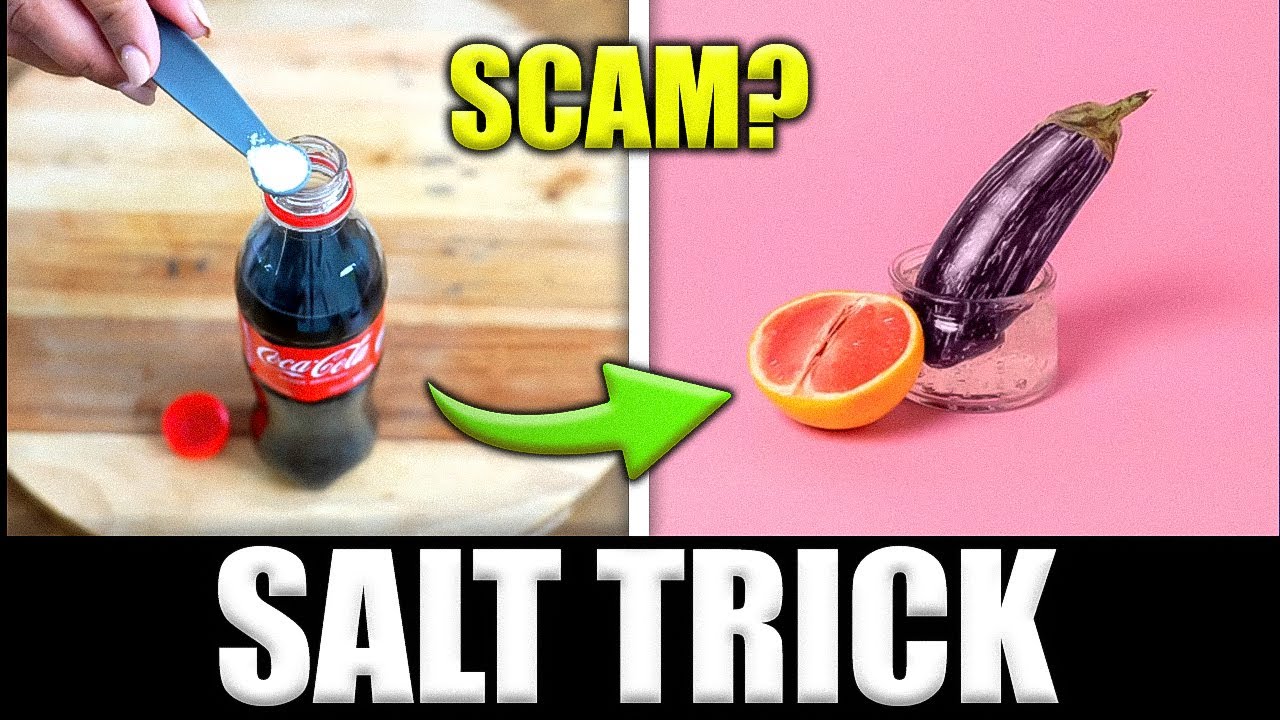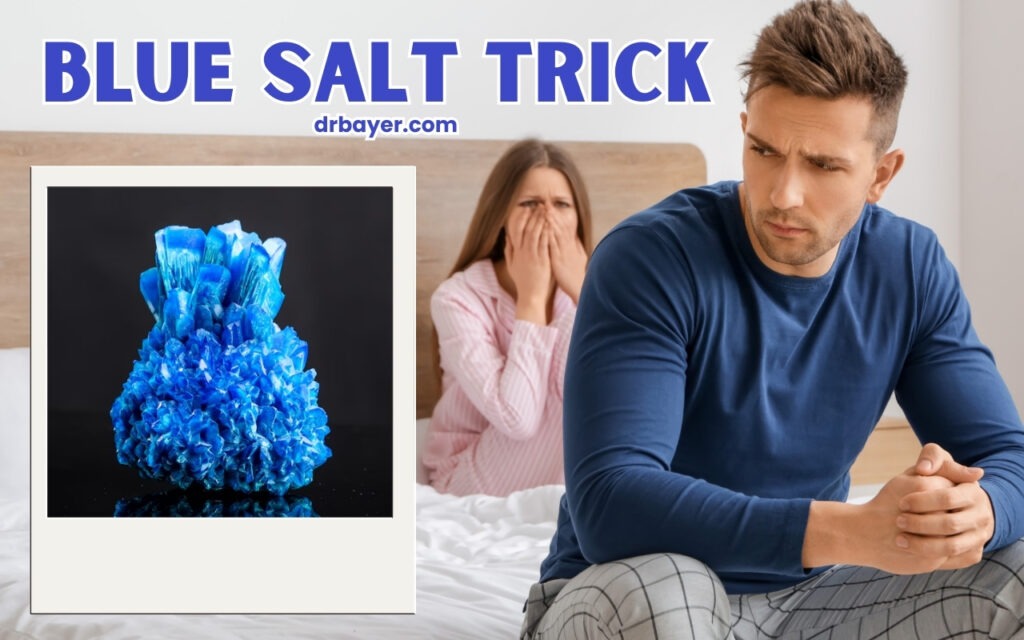Blue Salt Trick Scam: The Truth Unveiled You Need To Know
Have you ever heard about the blue salt trick scam and wondered if it’s legit or just another internet hoax? Well, buckle up because we’re diving deep into this topic to uncover the facts. If you're searching for answers, you're in the right place. The blue salt trick has been making waves online, and today, we’re going to break it all down for you.
People are always on the hunt for quick fixes and easy solutions, especially when it comes to health, beauty, or even cleaning hacks. But not everything you see on social media or forums is trustworthy. The blue salt trick has sparked debates, and it’s time to separate fact from fiction.
Before we dive into the nitty-gritty, let’s set the stage. This article will explore everything you need to know about the blue salt trick scam, including its origins, claims, and the science—or lack thereof—behind it. By the end of this, you’ll have a clear understanding of whether this trick is worth your time or if it’s just another scam waiting to happen.
Read also:Jane Pauley Opens Up About A High School Moment That Changed Her Life
What Exactly is the Blue Salt Trick?
The blue salt trick is one of those internet sensations that claims to work wonders for various purposes, from detoxifying your body to cleaning your home. But what exactly is it? Blue salt, also known as Prussian blue, is a compound that has been used in industrial applications for centuries. However, its recent popularity online has raised eyebrows and concerns.
Here’s the deal: the blue salt trick is marketed as a miracle solution for everything under the sun. Some people swear by it, while others call it a scam. Let’s take a closer look at the claims:
- Detoxifies your body by removing toxins.
- Improves skin health and reduces acne.
- Acts as an all-purpose cleaner for your home.
- Boosts your immune system.
But are these claims backed by science? We’ll get to that in a bit.
Is the Blue Salt Trick a Scam? Separating Fact from Fiction
Now, the big question: is the blue salt trick a scam? To answer that, we need to delve into the science behind it. First off, Prussian blue is not something you want to ingest lightly. It’s primarily used in industrial applications, and its safety for human consumption is highly questionable.
Here’s the truth: while Prussian blue does have some legitimate uses in medicine—for instance, treating radiation exposure—it’s not meant for casual consumption or DIY detoxes. In fact, using it improperly can lead to serious health risks. So, if you’re thinking about trying the blue salt trick, think again.
Why Do People Believe in the Blue Salt Trick?
It’s all about marketing. The blue salt trick has been cleverly marketed as a natural and safe solution for various problems. People are drawn to the idea of a quick fix, especially when it involves something as seemingly harmless as salt. However, the reality is far more complicated.
Read also:Queen Elizabeths Starstudded 92nd Birthday Bash All The Details
Many of the claims surrounding the blue salt trick are based on anecdotal evidence rather than scientific research. Just because someone on social media says it works doesn’t mean it’s true. Always do your research before jumping on any trend.
Where Did the Blue Salt Trick Originate?
Like many internet phenomena, the blue salt trick gained traction through social media platforms like TikTok and Instagram. Users began sharing videos and posts claiming that blue salt could work miracles. These posts often went viral, attracting millions of views and sparking curiosity.
However, the origins of the blue salt trick are murky at best. Some say it started as a harmless experiment, while others believe it was a deliberate attempt to create buzz. Regardless of its origins, the blue salt trick has become a hotly debated topic in online communities.
The Role of Social Media in Promoting Scams
Social media has a way of amplifying trends, whether they’re legitimate or not. The blue salt trick is just one example of how misinformation can spread rapidly online. Platforms like TikTok and Instagram rely on user-generated content, which means anyone can post anything without much scrutiny.
This lack of regulation makes it easy for scams to gain traction. People see others trying the blue salt trick and assume it must be safe if so many are doing it. But the truth is, not everything you see online is trustworthy. Always verify the information before taking it at face value.
Health Risks Associated with the Blue Salt Trick
Now, let’s talk about the elephant in the room: the health risks. Using blue salt improperly can lead to serious consequences. Prussian blue is not meant for casual consumption, and ingesting it without proper medical supervision can be dangerous.
Here are some potential risks:
- Poisoning from improper use.
- Adverse reactions in people with allergies or sensitivities.
- Damage to internal organs if consumed in large quantities.
- Interaction with other medications or supplements.
It’s crucial to prioritize your health and safety. If you’re considering trying the blue salt trick, consult a healthcare professional first. Your well-being is more important than any internet trend.
How to Stay Safe Online
With so many scams and hoaxes circulating online, it’s essential to stay informed and vigilant. Here are a few tips to help you avoid falling victim to the next big scam:
- Always verify the source of the information.
- Look for scientific studies or expert opinions to back up claims.
- Be cautious of products or tricks that promise miraculous results.
- Trust your instincts—if something seems too good to be true, it probably is.
By staying informed and critical, you can protect yourself from scams like the blue salt trick.
Alternatives to the Blue Salt Trick
If you’re looking for safe and effective ways to improve your health or clean your home, there are plenty of alternatives to the blue salt trick. Here are a few options:
- For detoxifying your body: focus on a balanced diet, regular exercise, and plenty of water.
- For skin health: use products formulated specifically for your skin type and consult a dermatologist if needed.
- For cleaning: stick to trusted household cleaners and natural alternatives like vinegar and baking soda.
There’s no need to resort to untested and potentially dangerous tricks when safer options are available.
Why Choose Science-Backed Solutions?
Science-backed solutions are always the better choice. They’ve been tested, proven, and are safe for use. Unlike the blue salt trick, which relies on anecdotal evidence, science-backed solutions provide real results without putting your health at risk.
So, the next time you come across a trend like the blue salt trick, ask yourself: is this really worth it? Chances are, there’s a safer and more effective alternative out there.
Expert Opinions on the Blue Salt Trick
To get a clearer picture of the blue salt trick scam, we reached out to experts in the fields of health, nutrition, and toxicology. Their insights shed light on the potential dangers and the lack of scientific evidence supporting the claims.
Dr. Emily Carter, a toxicologist, had this to say: “Prussian blue is not something you should be using casually. While it has legitimate medical uses, it’s not meant for DIY detoxes or cleaning. People need to be aware of the risks involved.”
Similarly, nutritionist Sarah Thompson warned against the trend: “There’s no scientific evidence to support the claims made about the blue salt trick. If you’re looking for ways to improve your health, focus on evidence-based solutions.”
Why Expert Opinions Matter
Expert opinions matter because they provide a reliable source of information. When it comes to health and safety, it’s important to trust professionals who have the knowledge and expertise to guide you. Don’t rely solely on internet trends or anecdotal evidence—consult experts to ensure you’re making informed decisions.
How to Spot a Scam Online
Spotting a scam online can be tricky, but there are a few red flags to watch out for. Here’s what to look for:
- Unrealistic claims with no scientific backing.
- Products or tricks marketed as “miracle solutions.”
- Lack of transparency about ingredients or methods.
- User testimonials without verifiable sources.
By being aware of these red flags, you can protect yourself from falling for scams like the blue salt trick.
The Importance of Critical Thinking
Critical thinking is key when evaluating information online. Don’t take everything you see at face value. Always ask questions, seek out multiple sources, and verify the facts before making any decisions. Your ability to think critically can save you from scams and misinformation.
Final Thoughts: Is the Blue Salt Trick Worth It?
After exploring the blue salt trick scam in depth, it’s clear that this trend is not worth the risk. While it may seem tempting to try a quick fix, the potential dangers outweigh any perceived benefits. Always prioritize your health and safety over internet trends.
Here’s a quick recap of what we’ve covered:
- The blue salt trick is not backed by scientific evidence.
- Using Prussian blue improperly can lead to serious health risks.
- There are safer and more effective alternatives available.
- Always consult experts before trying new health or cleaning trends.
So, the next time you come across the blue salt trick or any similar trend, remember to do your research and think critically. Your well-being is worth more than any internet sensation.
Now it’s your turn! Have you heard about the blue salt trick? What are your thoughts on it? Leave a comment below and share this article with your friends to help spread the word. Together, we can combat misinformation and stay safe online.
Table of Contents
- What Exactly is the Blue Salt Trick?
- Is the Blue Salt Trick a Scam?
- Where Did the Blue Salt Trick Originate?
- Health Risks Associated with the Blue Salt Trick
- Alternatives to the Blue Salt Trick
- Expert Opinions on the Blue Salt Trick
- How to Spot a Scam Online
- The Importance of Critical Thinking
- Final Thoughts
Article Recommendations


